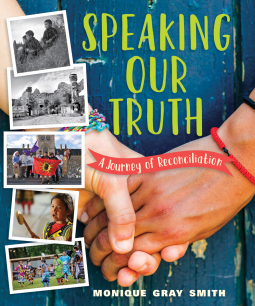 The nonfiction book Speaking Our Truth by Monique Gray Smith takes an in-depth look at the residential school system in Canada, but its interest spreads to the United States since similar schools and problems occurred here. Interest in this book extends to anyone concerned with fair treatment of Indigenous people wherever they occur. The author, with Cree, Lakota, and Scottish heritage, infuses her account with personal passion.
The nonfiction book Speaking Our Truth by Monique Gray Smith takes an in-depth look at the residential school system in Canada, but its interest spreads to the United States since similar schools and problems occurred here. Interest in this book extends to anyone concerned with fair treatment of Indigenous people wherever they occur. The author, with Cree, Lakota, and Scottish heritage, infuses her account with personal passion.
Her book cites the report “The Survivors Speak: A Report of the Truth and Reconciliation Commission of Canada” as background and looks to bring action to the findings of the Truth and Reconciliation Commission. In the initial chapter, she gives the names used to describe these first people – Indian, Native, First Nation, Aboriginal, and Indigenous – explaining that she will use the one that was the norm of the time as she tells the story beginning with Indian for the 1800s and coming to Indigenous for the present day.
Scattered throughout the book are personal accounts of those she calls Survivors who lived through experiences in the residential schools, sometimes with one generation repeating the last. Separated from parents and unable to practice their culture or speak their own language, indigenous children also suffered abuse, deprivation, and hunger in the schools. Frequently, discipline patterns learned at the school were passed along to children of these Survivors. The reader is left wondering who thought this would be a good idea.
Balancing the negative picture comes the efforts now being made to bring reconciliation and hope with projects such as Orange Shirt Day, the Blanket Exercise, and Project of the Heart. Discussion questions leading to empathy thread through the narrative. Back matter includes opportunities for further study in Online Resources, Reading List, Glossary, List of Residential Schools, and an Index.
As a coincidence, the next book I read and will not be discussing or recommending had a girl “whooping like an Indian on the warpath.” I would have been offended by the negative stereotype, but coming immediately after Speaking Our Truth, the phrase touched a newly exposed nerve.
In a second coincidence, I need to get this posted quickly so I can leave for the Native American Mounds Tour in and around Natchez with the Osher Lifelong Learning Institute. Maybe I’ll find another accurate and empathetic story today.